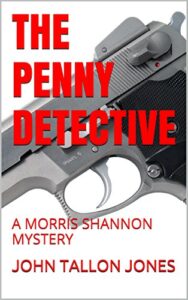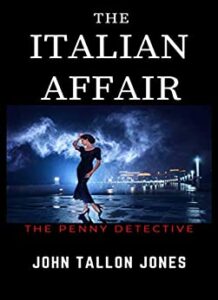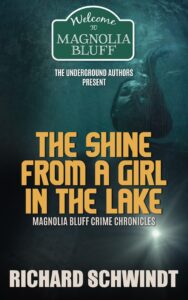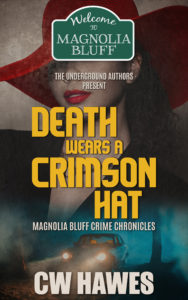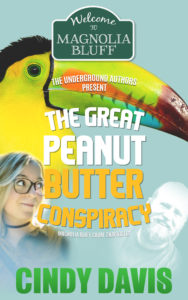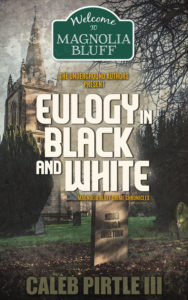In my last post, I talked about A Dewey Decimal Dilemma, which is the next book in the Magnolia Bluff Crime Chronicles series.
In this post, I’m going to give you a sample taken from the first chapter. Sit back and let your eyes feast on the beginning of an exciting new mystery!
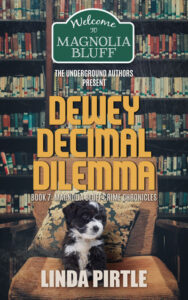
Chapter 1
Thursday afternoon. Caroline McCluskey removed the scrunchie holding her shoulder-length blonde ponytail in place.
Better make sure the conference room is ready.
Caroline walked to the front of the library and entered the conference room on the right side of the entry. On the back wall of the room two sliding doors guarded a mini-kitchen. Caroline pushed them apart and set out bottles of water.
“Hey, girlfriend,” a familiar voice said. “Is the conference room ready for us?”
Caroline smiled at Daphne Leigh, the newest member of the Magnolia Bluff Writers Association (MBWA) critique group. “My, aren’t you early today,” she teased. “I love your enthusiasm, Daphne, and look forward to hearing your story.”
Daphne Leigh ran a successful salon and knew more about the residents of Magnolia Bluff than any other member of the writers in the group.
Daphne scrunched her eyebrows and said, “Don’t mind me. The Grand Dame of Magnolia was my last client. Thought she would never quit talking so I could leave the salon and avoid a last minute walk-in customer. I’m excited about my story.”
Caroline shook her head, hearing Daphne’s nickname for Magnolia Nadine, the current president of the Junior Service League and overall community busybody – correction, she thought – community organizer.
“The room is open. Go on inside. I’m sure the other members will straggle in when they can.”
Caroline heard voices. “I’d better hurry up. Why don’t you go meet the other writers while I make my rounds?” She waved at Pauline Tidwell and LouEllen Mueller before going downstairs to the library’s basement which housed the periodicals, reference section, and genealogical records. Caroline took a deep breath. Ah, there’s nothing like the aroma of history stored in these racks. Satisfied that all was well, Caroline locked the inner door to the library and joined the MBWA group standing in the foyer. “You didn’t have to wait for me.”
“The door’s locked,” growled Graham Huston, the editor of the local newspaper.
“Shouldn’t be.” She shrugged and pulled the spiral key chain she kept tucked between her blouse and the waistband of her slacks. Unlocking the door, she stepped back and motioned for the others to enter. Already grumpy. I wonder what has him all stirred up.
“It’s six-thirty,” Graham Huston said, checking his watch. “How long are we going to wait for Thurgood?”
Reverend William Robert Baskin, called Billy Bob by his friends and family, took a sip from his Styrofoam cup and peered over his reading glasses at the editor. “Thurgood was quite busy when I stopped by the coffee shop ten minutes ago. He said he might be a few minutes late.”
“Let’s be patient,” Caroline said. “I’m sure Thurgood will come as soon as his last customer leaves.”
Less than two minutes later Thurgood came flying through the front door of the library. “Hey, guys, sorry I’m late.”
“Hmph,” said Huston, dismissing him with a flick of his wrist. “Call this meeting to order, Ms. Caroline, so we can get started. I have an interview for a feature story in tomorrow’s edition to write when I get back to the office tonight.”
“Ah, now would your interview be a vertical or horizontal one?” Thurgood taunted.
For once, Huston had no snarky retort. He simply wiggled his eyebrows and grinned.
Caroline tapped her gavel on the table. “Meeting called to order.” She looked around the table at her colleagues. “Folks, even though she’s no stranger and has given you haircuts and perms for years, I’d like to introduce our newest member to you: Daphne Leigh.”
“Here, here,” Baskin said, giving Daphne a high-five. “Welcome aboard.”
“Okay, as I recall from our last meeting, we decided that the person seated next to Graham would be our first victim,” Pauline Tidwell, the recording secretary said. “And, I’m sorry to say that would be you, Daphne.”
A few relieved chuckles from the others told Caroline that now – before giving Huston an opportunity to speak – would be a good time to review the purpose of the critique group.
“Okay, let’s remember to offer constructive comments in a positive way. No need to insult anyone.” Caroline said, looking directly at Graham Huston. “And since our illustrious newspaper editor has an interview after our meeting, we’ll postpone our usual social hour until the end of meeting. Let’s give an applause to LouEllen who so graciously provided snacks.”
Huston grinned. “Thank you, Madame President.” He turned to Daphne, “Are you ready to read the first fifteen hundred words of your story?”
“Yes, sir.” She passed around copies of her pages so that everyone could silently read along with her.
Thurgood smiled. “Why, Daphne, I’m surprised.”
“Why do you say that?” asked Baskin.
“Three evenings a week, Daphne comes by the coffee shop on her way home. She always sits at the corner table and writes poetry.”
Baskin’s dark chocolate eyes lit up. “I see.” Turning to Daphne, he said, “Good for you. I’m sure all of us will enjoy your story.”
“Okay, you two guys, quit jawing and let Daphne begin,” instructed Huston.
“Here, here,” said LouEllen. She pushed an unruly lock of her long, blonde hair over her ear and leaned forward, propping both elbows on the table and revealing an ample cleavage in the process.
Caroline choked back a giggle when the good reverend quickly turned his gaze back to the newbie short story author poised to read. She noticed that Thurgood’s attention lingered until LouEllen winked at him. I wonder about those two.
“The title of my first short story is…”
And that’s as far as Daphne read.
Graham Huston interrupted. “‘The Stranger in My Chair.’
What kind of title is that? Tell me you haven’t re-written the three bears and goldie-what’s-her-name?”
“Now, Graham, don’t be rude. Let the woman read her story,” LouEllen chided.
Mouth agape, Daphne sat frozen, not knowing what to do until Caroline said softly. “Yes, dear, go ahead. We’re all anxious to hear it.” She nodded and smiled encouragingly.
Billy Bob used a blue ballpoint pen with First Presbyterian Church engraved on its side. He made checkmarks at the end of several lines. Evidently, Caroline thought, he would make comments about those phrases when it came his turn to talk. Such a kind man. At every meeting, he goes out of his way to tolerate Graham’s insolence. He has the patience of Job.
The retired high school math teacher, Pauline, gazed out the large oval lead-glass window that faced the parking lot. It was evident she wasn’t listening to Daphne. She’s in another world. Looks worried. I bet it’s that no–good husband of hers. I wish Pauline would divorce him. As if Pauline heard Caroline’s thoughts, she jerked alert and began marking punctuation errors and writing notes in the margins.
LouEllen, a Dolly Parton look alike with big Texas hair, used a yellow highlighter on a couple of lines, smiling as she did so. Like me, she’s a widow. Unlike me, she’s in the market. Like me, she admires muscular physiques. And with that last thought, Caroline felt Thurgood’s scrutiny. His bright blue eyes held their proverbial twinkle. He grinned and motioned his head toward Huston who glared at Daphne.
“The end,” Daphne announced, shoulders squared, smiling as if she were waiting for a round of applause from the critique group.
Silence.
Everyone waited.
Graham Huston was supposed to speak first. And he did. “I’ve never in my life heard anything quite so…so…” Graham was obviously out of character trying to search for the right word, a positive one.
Caroline had never seen the man so speechless. Uh oh. Be prepared, Daphne.
Silence.
Daphne smiled at Huston, expecting to hear some praise.
“What the hell was that all about?” He roared like a stuck pig.
Red faced, Daphne asked, “Didn’t you understand the plot?”
“Hell, woman, there was no plot, no characterization, no conflict, nothing,” he said.
“I’ve read that all good novelists let dialogue carry the story, and that’s what I tried to do,” explained Daphne.
“You’re correct. Dialogue is important, but not when the characters are just talking heads,” Huston growled. “My advice to you, Ms. Daphne, is to stick with writing prissy poetry down at Thurgood’s Really Good Wood-Fired Coffee Shop and cutting hair at the Head Case.” As he spoke, he gestured quotation marks around the name of the coffee shop. “No one has to understand that drivel.”
“How can you be so cruel, Graham?” Daphne glared, trying to control tears that threatened her resolve to be brave. She pulled the headband holding her thick hair in place and slung it down as if it were a gauntlet. Her unruly red curls, freed at last, fell forward but failed to obscure the tears that trickled down her cheeks.
“Now, now,” said Baskin. “There’s no need to make her cry.” He reached across the table and handed Daphne a handkerchief. “Here. Dry your eyes. None of us are perfect writers. We’re all here to learn.” He leaned back in his chair. “I’m sure Graham didn’t intend to sound so harsh.”
“Well, my good reverend, there’s where you’re wrong. I meant every word I said.” He pointed his finger at her. “My suggestion, young lady, is that you enroll in a writing course out at the college right here in town.”
“Let’s be nice,” said Caroline. “Graham, I think you need to explain ‘talking heads’.” She looked at Daphne and said, “A lot of novice authors make that same mistake.”
“Oh, give me a break,” Graham grumbled.
“No, you give her a break,” interjected LouEllen. “I’ve sat here week after week listening to your almighty highness cutting down all of our work. But no more. I’m tired of your arrogance, Graham Huston.”
“Arrogance?” he sneered. “Seems to me that a woman who owns the bar her husband – a dead husband with a suspicious death – ought not to lecture a professional newspaper editor. After all, what can you contribute to literature other than stories from the gutter?”
“Graham, listen to me,” Caroline said. When she knew she had his attention, she said, “That’s going too far. Remember our purpose. We critique the written word, not the person.”
LouEllen stood and silently walked toward Graham.
Caroline had witnessed the owner of Lou Ellen’s Lounge laughingly deal with a patron who had imbibed too many martinis. She was always so amiable while kicking the person out that he or she didn’t put up any fight. But the woman, dressed in animal print leggings stalking toward Graham Huston wasn’t smiling. Her eyes glowed with red, hot anger.
Graham had no idea he had suddenly become the prey of a mama tigress intent on protecting her friend.
Caroline held her breath. The word murder popped into her brain.
LouEllen stopped. She grabbed the chair and swirled it around so that Graham faced her.
Glad friends of the library bought chairs that rolled last year. Otherwise, I’d have a hard time tomorrow explaining broken chair legs and ripped carpet.
If she had not feared for his life, Caroline would have enjoyed his shocked expression. She glanced around the room. The other writers were just as surprised as Graham. No one had ever seen LouEllen that angry.
“Now you listen to me, Graham Huston. I will not sit idly by while you demoralize Daphne. I sure hope you aren’t that rude the next time she cuts your hair. It’s hard enough to listen to someone critique what you’ve put your heart and soul into, but you’ve gone beyond being helpful. The rest of us have been writing long enough that your snarky criticisms don’t mean a damn thing.”
Graham met LouEllen’s challenge though his voice had lost its edge. “Well, believe it or not, I was only trying to point out the fact that she’s a poet – good or bad, I don’t know because I hate the stuff and don’t read it – but she needs to learn more about the craft of narrative creative writing than we can teach her in a critique group.”
“Oh, you’re saying we don’t know what we’re doing? That some hoity-toity professor with absolutely no real-world teaching experience can do better? That she has to pay for a course at the college?”
“Yes, that’s exactly what I said minus the hoity-toity,” Graham growled. “And it wouldn’t hurt you to take the same class.” He sneered.
“Now, Graham…” Baskin made an attempt to speak but was not fast enough.
The tigress bent down, ready for the kill. “If I weren’t a lady, I’d slap you crossed-eyed right now,” LouEllen hissed and proceeded to resume her place at the conference table.
“Lady?” Graham asked.
LouEllen turned back, but Thurgood saved the day. In Caroline’s opinion, he was enjoying the show. He piped up with a rhetorical question. “Uh, Graham, who teaches that class?”
Graham’s demeanor changed. His face relaxed and his back straightened when he turned to Thurgood and said, “Well, as a matter of fact, I do.”
“Ah, ha,” LouEllen exclaimed from the far end of the table. “It wasn’t enough for you to take over the newspaper after Neal Holland’s untimely death. If the college isn’t alert, its president might die suddenly.” She laced her fingers together and used them as a prop for her chin, satisfied she had put the former press cleaner in his place.
“Oh my goodness,” Graham drawled. “At least, Holland’s death wasn’t the result of a poor diet.”
“Has anyone ever told you that you are an…?” LouEllen began but stopped short. “Sorry, reverend.”
Baskin shook his head. “Oh, don’t mind me. In my profession, I’ve heard it all.”
Daphne stood. “I’m sorry I caused so much trouble.” She raced out of the building. Her sobs gradually faded as she rushed to her car in the parking lot.
“Now look what you two have done,” said Pauline. She crinkled up her nose as if to say the room and its current inhabitants had emitted a sour odor. “I can’t listen to any more of this.” She gathered her notebook and purse and followed Daphne outside.
“I guess this meeting is adjourned,” said Baskin standing. He, too, left the conference room.
Graham stalked out of the building.
The conference room was eerily quiet.
Caroline, Thurgood, and LouEllen remained seated.
“That went well.” Thurgood chuckled.
“How about a drink?”
Thurgood saluted. “Miss LouEllen, I thought you’d never ask.”
Hope you enjoyed that sample of A Dewey Decimal Dilemma. The book is available from Amazon for only 99¢. But hurry, because that price won’t last for long.
Comments are always welcome! And until next time, happy reading!
 CW Hawes is a playwright, award-winning poet, and a fictioneer, with a bestselling novel. He’s also an armchair philosopher, political theorist, social commentator, and traveler. He loves a good cup of tea and agrees that everything’s better with pizza.
CW Hawes is a playwright, award-winning poet, and a fictioneer, with a bestselling novel. He’s also an armchair philosopher, political theorist, social commentator, and traveler. He loves a good cup of tea and agrees that everything’s better with pizza.
If you enjoyed this post, please consider buying me a cup of tea. Thanks! PayPal.me/CWHawes
Share This!

 CW Hawes is a playwright; award-winning poet; and a fictioneer, with a bestselling novel. He’s also an armchair philosopher, political theorist, social commentator, and traveler. He loves a good cup of tea and agrees that everything’s better with pizza.
CW Hawes is a playwright; award-winning poet; and a fictioneer, with a bestselling novel. He’s also an armchair philosopher, political theorist, social commentator, and traveler. He loves a good cup of tea and agrees that everything’s better with pizza.